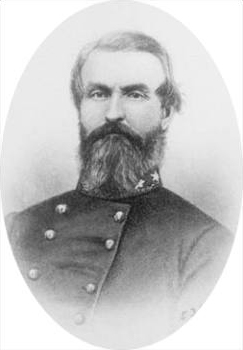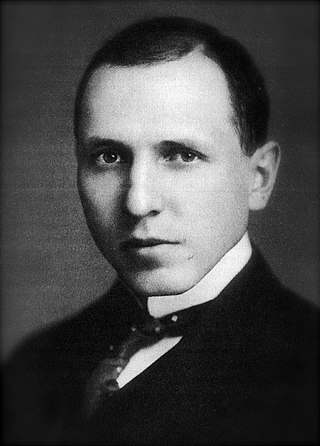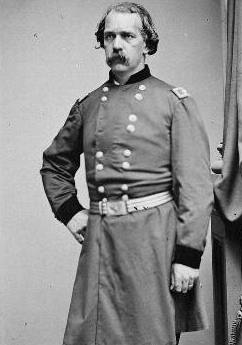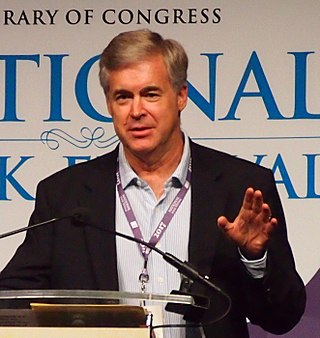Related Research Articles

Paul Jones Semmes was a banker, businessman, and a Confederate brigadier general during the American Civil War. He was mortally wounded at the Battle of Gettysburg.
In American history, the Fire-Eaters were a group of pro-slavery Democrats in the antebellum South who urged the separation of Southern states into a new nation, which became the Confederate States of America. The dean of the group was Robert Rhett of South Carolina. Some sought to revive America's participation in the Atlantic slave trade, which had been illegal since 1808.

Douglas Southall Freeman was an American historian, biographer, newspaper editor, radio commentator, and author. He is best known for his multi-volume biographies of Robert E. Lee and George Washington, for both of which he was awarded Pulitzer Prizes.

John Henry Hobart Ward was an American soldier who fought in the Mexican–American War and in the American Civil War. Ward joined the army in 1842 and fought in multiple battles in the Mexican–American war, including the Battle of Monterrey, where he was wounded. After leaving the army, he served successively as the assistant commissary general and commissary general for the state of New York. With the outbreak of the American Civil War in 1861, Ward rejoined the army, and became the colonel of the 38th New York Infantry Regiment. Ward and his regiment were engaged in the First Battle of Bull Run and in several battles in the Peninsula campaign. He was promoted to command a brigade after the Battle of Chantilly in September 1862.
The Gilder Lehrman Institute of American History was founded in New York City by businessmen-philanthropists Richard Gilder and Lewis E. Lehrman in 1994 to promote the study and interest in American history.

James Chesnut Jr. was an American lawyer and politician, and a Confederate functionary.

John F. Marszalek is an American historian who served as Executive Director and Managing Editor of the Ulysses S. Grant Association and The Papers of Ulysses S. Grant project from 2008 to 2022.
The Gilder Lehrman Lincoln Prize, founded by the late Richard Gilder and Lewis Lehrman in partnership with Gabor Boritt, Director Emeritus of the Civil War Institute at Gettysburg College, is administered by the Gilder Lehrman Institute for American History. It has been awarded annually since 1991 for "the finest scholarly work in English on Abraham Lincoln, the American Civil War soldier, or the American Civil War era."

David William Blight is the Sterling Professor of History, of African American Studies, and of American Studies and Director of the Gilder Lehrman Center for the Study of Slavery, Resistance, and Abolition at Yale University. Previously, Blight was a professor of History at Amherst College, where he taught for 13 years. He has won several awards, including the Bancroft Prize and Frederick Douglass Prize for Race and Reunion: The Civil War in American Memory, and the Pulitzer Prize and Lincoln Prize for Frederick Douglass: Prophet of Freedom. In 2021, he was elected to the American Philosophical Society.

Gabor S. Boritt is an American historian. He was the Robert Fluhrer Professor of Civil War Studies and Director of the Civil War Institute at Gettysburg College. Born and raised in Hungary, he participated as a teenager in the Hungarian Revolution of 1956 against the Soviet Union before escaping to America, where he received his higher education and became a scholar of Abraham Lincoln and the American Civil War. He is the author, co-author, or editor of 16 books about Lincoln or the War. Boritt received the National Humanities Medal in 2008 from President George W. Bush.

Louisiana was a dominant population center in the southwest of the Confederate States of America, controlling the wealthy trade center of New Orleans, and contributing the French Creole and Cajun populations to the demographic composition of a predominantly Anglo-American country. In the antebellum period, Louisiana was a slave state, where enslaved African Americans had comprised the majority of the population during the eighteenth-century French and Spanish dominations. By the time the United States acquired the territory (1803) and Louisiana became a state (1812), the institution of slavery was entrenched. By 1860, 47% of the state's population were enslaved, though the state also had one of the largest free black populations in the United States. Much of the white population, particularly in the cities, supported slavery, while pockets of support for the U.S. and its government existed in the more rural areas.
The bibliography of the American Civil War comprises books that deal in large part with the American Civil War. There are over 60,000 books on the war, with more appearing each month. Authors James Lincoln Collier and Christopher Collier stated in 2012, "No event in American history has been so thoroughly studied, not merely by historians, but by tens of thousands of other Americans who have made the war their hobby. Perhaps a hundred thousand books have been published about the Civil War."
George Varney (1834–1911) was a colonel in the Union Army during the American Civil War and was awarded the grade of brevet brigadier general, United States Volunteers, in 1867 for his gallant service at the Battle of Fredericksburg on December 13, 1862. Born in Levant, Maine, he was a wholesale grocer in Bangor, Maine when the war broke out in 1861.
Kenneth W. Noe is an American historian whose primary interests are the American Civil War, Appalachia and the American South. He has most recently published The Howling Storm: Weather, Climate, and the American Civil War.
The American Civil War bibliography comprises books that deal in large part with the American Civil War. There are over 60,000 books on the war, with more appearing each month. There is no complete bibliography to the war; the largest guide to books is over 40 years old and lists over 6,000 titles selected by leading scholars. Many specialized topics such as Abraham Lincoln, women, and medicine have their own lengthy bibliographies. The books on major campaigns typically contain their own specialized guides to the sources and literature. The most comprehensive guide to the historiography annotates over a thousand titles.
Elizabeth D. Leonard is an American historian and the John J. and Cornelia V. Gibson Professor of History at Colby College in Maine. Her areas of specialty include American women and the Civil War era.
William C. Harris is Professor Emeritus of History at North Carolina State University. In 2012, he was co-winner of the 2012 Lincoln Prize for Lincoln and the Border States: Preserving the Union.

Peter Cozzens is an American historian and retired U.S. Foreign Service Officer. He has written and/or edited over seventeen books on the American Civil War and the American Indian Wars.

Gary William Gallagher is an American historian specializing in the history of the American Civil War. Gallagher is currently the John L. Nau III Professor in the History of the American Civil War at the University of Virginia. He produced a lecture series on the American Civil War for The Great Courses lecture series.
The 5th Louisiana Infantry Regiment was a unit of volunteers recruited in Louisiana that fought in the Confederate States Army during the American Civil War. Formed in June 1861, the regiment was sent to fight in the Eastern Theater of the American Civil War. The regiment served at Yorktown, White Oak Swamp, Cedar Mountain, Second Bull Run, Harpers Ferry, Antietam, and Fredericksburg in 1862. The regiment fought at Chancellorsville, Second Winchester, and Gettysburg in 1863. At Rappahannock Station in November 1863, virtually the whole regiment was captured. The unit's remnant fought at the Wilderness, Spotsylvania, Cold Harbor, and the Valley campaigns of 1864. It served at Petersburg starting in December 1864 and a mere handful surrendered at Appomattox in April 1865.
References
- 1 2 3 "George C. Rable".
- ↑ "Professor Emeritus George Rable Featured in Documentary".
- ↑ "Fredericksburg! Fredericksburg! - George C. Rable - University of North Carolina". Archived from the original on 2009-02-13. Retrieved 2008-07-07.
- ↑ "Gilder Lehrman Lincoln Prize - The Gilder Lehrman Institute of American History". 31 October 2011. Archived from the original on 10 April 2017. Retrieved 31 January 2017.
- 1 2 "Awards and Recognition - American Civil War Museum". Archived from the original on 2016-10-14. Retrieved 2017-01-31.
- ↑ "Douglas Southall Freeman History Award". 17 November 2010.